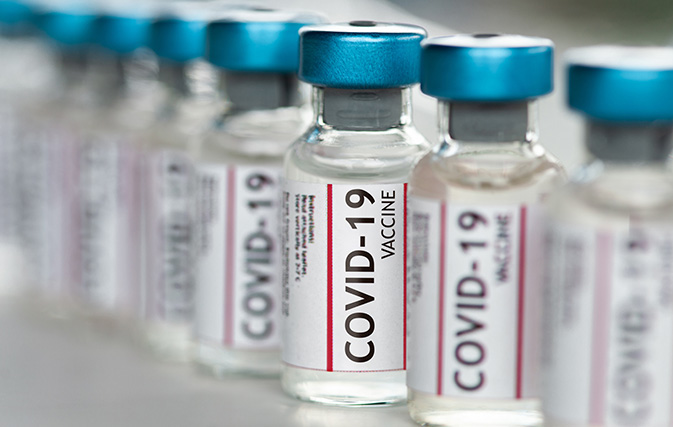OTTAWA — While the federal government has issued its latest salvo in its back-and-forth with Ontario Premier Doug Ford over travel restrictions, new reports say Public Health Canada has confirmed that Canadians can cross the Canada-U.S. border for COVID-19 vaccinations without having to quarantine upon their return.
PHAC has confirmed that Canadian residents are allowed to head to the U.S. for a COVID-19 vaccine and avoid quarantine on return if they meet some straightforward conditions.
Those conditions include having a note from a licensed health-care provider in Canada that the inoculation is medically necessary, and written proof from the licensed U.S. vaccine provider.
Quarantine regulations passed by the federal government contain an exemption for essential medical services obtained abroad. A coronavirus shot, PHAC says, falls under that definition.
The exemption offers people within driving range of border states with plenty of vaccines a relatively simple way to get a COVID-19 vaccine shot quickly. While supplies are ramping up in Canada, distribution in many areas remains tenuous and age and other eligibility limits remain in place.
Information on the regulations and exemption, created by federal cabinet and contained on the government’s website, was confirmed by PHAC in an email to David Musyj, head of the Windsor Regional Hospital in the border city of Windsor, ON.
Musyj had pressed Health Canada for answers after noting that people could easily drive over to Detroit for a shot, but having to isolate for 14 days on return would be a major obstacle.
“It does verify our interpretation of the current order in council/website information is accurate – that a COVID-19 vaccine is an ‘essential medical service or treatment,’Musyj said. ”It makes it clear the exemption is permissive.”
However, public health also said in a written exchange with Musyj that crossing the border – which remains closed to non-essential travel – for a vaccine would not be licence to tack on shopping or other activities. In addition, to qualify for an exemption, the trip has to be in a private vehicle but can include a support person.
“Very clear: You need to go to the appointment only and return immediately,” Musyj said. “Cannot stop anywhere else for anything.”
On return, health authorities said, quarantine-exempt travellers must wear a mask in public spaces at all times and keep a list of close contacts and places visited for 14 days.
Health Canada also noted that U.S. border agents have final say on who they let in, and that it is up to returning travellers to provide the required documents to Canada Border Services agents for a final decision on a quarantine exemption.
“The onus is on the traveller to clearly demonstrate they meet an exemption under the order in council,” the public health agency said.
Musyj said he was still pushing for federal approval to allow an organized effort to retrieve surplus vaccines from Detroit and bring them back to Canada for use here. The same vaccines produced in Kalamazoo, MI are also distributed in Canada but demand in the U.S. has lagged supply.
The federal government has said millions of COVID-19 inoculation doses are set to start arriving in the coming days, but however in some areas supplies remain limited.
“THIS IS NOT JUST AN ONTARIO PROBLEM”
Meanwhile Canada’s Minister of Intergovernmental Affairs, Dominic LeBlanc, yesterday issued a statement in the wake of Ontario Premier Doug Ford’s repeated calls for tighter travel restrictions.
Ford and the federal government have been engaged in a war of words over whether or not further travel restrictions and testing is needed for domestic flights coming into Pearson Airport, which falls under federal jurisdiction.
Last month Ford handed down additional layers of travel restrictions including measures against interprovincial travel by land. Most other provinces also currently have interprovincial travel restrictions in place.
Yesterday Ford sent out a tweet saying: “Every day, we see domestic flights landing in Ontario with COVID-positive travellers. This is not just an Ontario problem – this is an issue all provinces are struggling with. It’s time for the federal government to require pre-departure PCR tests for all domestic flights.”
LeBlanc’s statement, also issued yesterday, notes that the federal government’s many layers of travel restrictions, many in place since March 2020, have resulted in a 96% reduction in air traffic and 90% reduction in non-commercial land traffic into Canada, when compared to pre-pandemic volumes. LeBlanc also says the federal government provided Ontario with extra PCR testing capabilities.
“Ontario is also within their jurisdiction to institute domestic travel quarantine. As we have seen in other jurisdictions, it is an effective public health measure. We continue to stand ready to support the Government of Ontario should they introduce additional measures within their jurisdiction,” said LeBlanc.
With file from The Canadian Press
Travelweek’s ‘Future of Travel: Sunnier Days Ahead’ takes place today, Wed. May 19, from 1 – 3 p.m. Click this link at 1 p.m. EDT to join: https://livemedia.biz/travelweek.html

